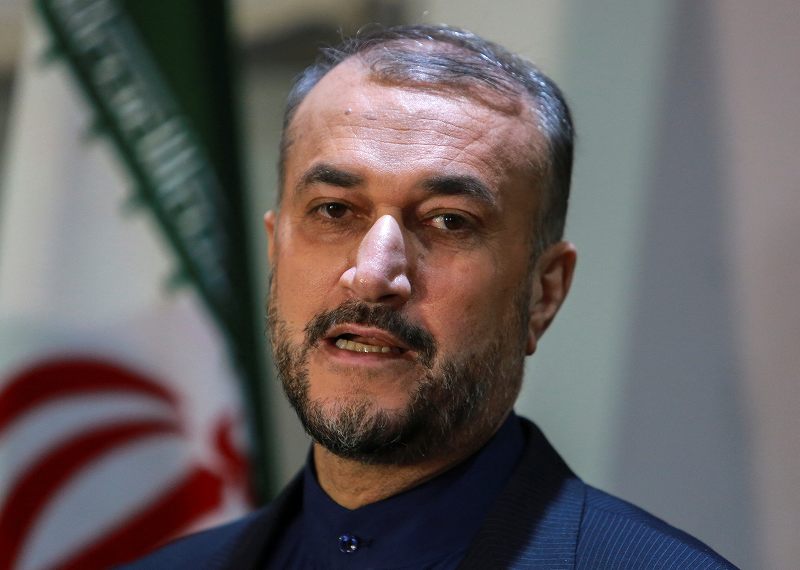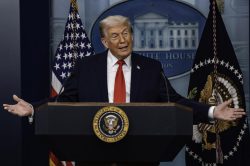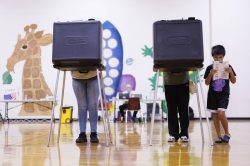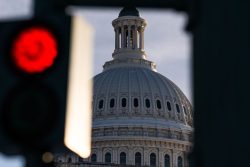
Iranian Foreign Minister Hossein Amir-Abdollahian speaks during a news conference with Lebanese Foreign Minister Abdallah Bou Habib in Beirut, Lebanon March 24, 2022.
13:27 JST, April 2, 2022
Tehran’s demand that the United States lift its designation of the Revolutionary Guard Corps as a foreign terrorist organization, and the U.S. refusal so far to do that, have brought the year-long negotiations over reviving the Iran nuclear deal to a halt, with no new meetings scheduled and little obvious room for compromise.
Since talks being held in Vienna adjourned last month, European participants have shuttled between Washington and Tehran in a vain search for accommodation from both sides. “At this point, nothing mutually acceptable” has been proposed, according to a U.S. official knowledgeable about the issue who, like others, spoke on the condition of anonymity to discuss the sensitive diplomatic and political matter.
Whether the United States will yield in any way is up to President Biden, and “the president hasn’t made a decision,” the official said. “Politically, we know that it’s an extremely difficult step to take.” For the moment, head U.S. negotiator Robert Malley said at a foreign policy forum last weekend, success “is not just around the corner, and not inevitable.”
Those beyond the inner circles in the two capitals are growing increasingly worried. “We must conclude this negotiation. Much is at stake,” Enrique Mora, the European Union deputy foreign policy chief wrote on Twitter last week before visits to both Washington and Tehran early this week. The E.U. is coordinating the talks between Iran and other signers of the original 2015 deal, which are Britain, France, Germany, Russia and China.
Although the talks essentially involve Iran and the United States, which withdrew from the agreement in 2018, Tehran has refused to speak directly to the Biden administration, which is technically only an indirect participant, speaking to Iran through the Europeans.
While there is a handful of other, less contentious issues still to be settled, people familiar with the matter indicated that disagreement now revolves almost entirely around the Revolutionary Guard Corps issue. Earlier U.S. consideration of a public Iranian statement disavowing regional aggression, in exchange for the terror delisting, is no longer on the table, the people said.
For the administration, the biggest impediment to lifting the designation is the likely reaction in Congress, where the delisting issue has only increased considerable bipartisan opposition to any revived agreement with Iran. In closed-door briefings and meetings with lawmakers in recent weeks, Malley and Brett McGurk, the Middle East coordinator at the National Security Council, have outlined what they believe would be the negligible effect of the delisting, as well as the peril of not concluding a deal.
The IRGC and its leaders are under a wealth of other State and Treasury Department terrorism sanctions that would remain in place, including Iran’s position as one of only four countries on the official U.S. list of state sponsors of terrorism.
Regardless of what happens in the negotiations, Malley said at the weekend conference in Doha, Qatar, “the IRGC will remain sanctioned under U.S. law and our policies, and our perceptions of the IRGC will not change.”
Speaking at the same forum, Kamal Kharazi, former Iranian foreign minister and current adviser to Supreme Leader Ali Khamenei, said that the IRGC “certainly must be removed” from the FTO list. When Foreign Minister Hossein Amir-Abdollahian indicated some flexibility in a recent Iranian television interview, he quickly backtracked, indicating in an Instagram post that the issue was a “red line” for Iran.
Designation as a foreign terrorist organization has enormous symbolic significance for both Iran and the United States. President Donald Trump announced the listing in April 2019, a year after he withdrew from the nuclear deal. The move was pushed by his secretary of state, Mike Pompeo, and national security adviser John Bolton, as part of what Trump called his “maximum pressure” sanctions campaign against Iran.
At the time, it was also widely seen as Trump’s attempt to boost the electoral chances of right wing Israeli prime minister Benjamin Netanyahu, who campaigned on security issues but who nonetheless failed the next day to garner enough votes to form a government.
The listing of the IRGC, an elite wing of the Iranian military responsible for its regional activities in Syria, Iraq and elsewhere, remains the only time the United States has so labeled part of another nation’s government. While the measure was hailed by some lawmakers, a number of commentators and sanctions experts argued that it pointlessly set a bad precedent, and would likely increase, rather than decrease, Iran’s aggression.
In promoting negotiations to return to the 2015 Joint Comprehensive Plan of Action, or JCPOA, the Biden administration has argued that Trump’s withdrawal from the agreement, which sharply limited Iran’s nuclear activities and brought it under international monitoring in exchange for the lifting of U.S. nuclear-related sanctions, has undermined U.S. security by bring Iran closer than ever to producing a nuclear weapon.
“This is no longer a thought experiment — what might happen if the nuclear shackles of the JCPOA were lifted and we tried something different . . . in the form of maximum pressure,” State Department spokesman Ned Price said Thursday. The Trump administration, he said, promised “a so-called better deal with Iran, an Iran whose proxies were cowed . . . whose support for terrorism would be diminished . . . whose ballistic missile program would be checked — all of those things turned out not only to be not true, but in almost every case the exact opposite has come to fruition.”
At the same time, while continuing to deny it seeks a nuclear bomb, Iran has vastly expanded the quality and quantity of uranium enrichment and is believed now only weeks away from assembling enough to fuel a weapon. It expanded other aggressive activities even as Trump reimposed sanctions that had been lifted by the JCPOA and imposed more than 1,500 more. Between 2019 and 2020, Price said, the number of attacks against U.S. personnel and facilities in Iraq by Iran-backed groups “went up 400 percent.”
Much of the Vienna negotiations over the past year were devoted to disagreements between Iran’s insistence that all U.S. sanctions be lifted, and administration insistence that a return to the JCPOA involved only those that were “nuclear-related.” Those issues, along with questions of sequencing and the unfreezing of certain Iranian assets, have now been largely resolved.
But as word spread that the biggest remaining issue on the table was the FTO designation of the Revolutionary Guard, opponents of the deal, including virtually all Republicans vowed to redouble their efforts to stop the agreement, and a number of Democrats expressed worries.
“Among other issues, we are highly concerned about reports indicating the potential lifting of the Foreign Terrorist Organization (FTO) designation of the Islamic Revolutionary Guard Corps (IRGC),” a bipartisan group of 21 House members wrote Biden earlier this month, saying that the combination of not “adequately addressing Iran’s role as the world’s leading state sponsor of terror,” and providing billions of dollars in sanctions relief would provide “a clear path for Iranian proxies to continue fueling terrorism.”
Any administration action is further complicated by reported U.S. intelligence indicating ongoing Iranian plots to target Pompeo and other former U.S. officials Tehran holds responsible for the January 2000 U.S. drone strike that killed Qasem Soleimani, commander of the Quds Force, the IRGC branch that specializes in unconventional warfare.
But others have warned that both Iranian and U.S. leaders have “painted themselves into a corner” by allowing the issue to become what may ultimately kill any prospect of a deal.
“Failure to secure the nuclear deal will very likely lead to unpredictable and possible uncontrollable escalation — and almost certainly skyrocketing oil and gas prices,” Trita Parsi, an Iran expert and executive vice president of the Quincy Institute for Responsible Statecraft wrote Thursday. “The political costs to both the United States and Iran of either delisting the IRGC or dropping the demand to delist, respectively, pale in comparison.”
Top Articles in News Services
-

Arctic Sees Unprecedented Heat as Climate Impacts Cascade
-

Prudential Life Expected to Face Inspection over Fraud
-

South Korea Prosecutor Seeks Death Penalty for Ex-President Yoon over Martial Law (Update)
-

Trump Names Former Federal Reserve Governor Warsh as the Next Fed Chair, Replacing Powell
-

Japan’s Nagasaki, Okinawa Make N.Y. Times’ 52 Places to Go in 2026
JN ACCESS RANKING
-

Univ. in Japan, Tokyo-Based Startup to Develop Satellite for Disaster Prevention Measures, Bears
-

JAL, ANA Cancel Flights During 3-day Holiday Weekend due to Blizzard
-

China Confirmed to Be Operating Drilling Vessel Near Japan-China Median Line
-

China Eyes Rare Earth Foothold in Malaysia to Maintain Dominance, Counter Japan, U.S.
-

Japan Institute to Use Domestic Commercial Optical Lattice Clock to Set Japan Standard Time

























